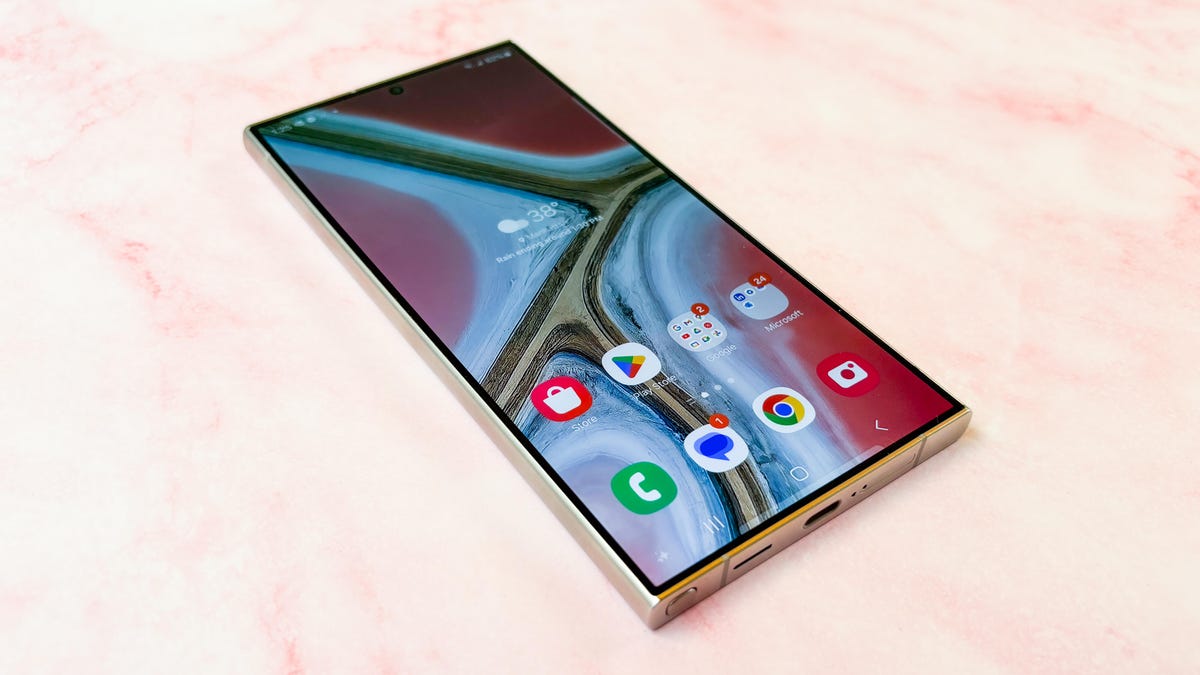Samsung's Galaxy S24 Ultra Missed an Opportunity With Galaxy AI
Commentary: Galaxy AI features that are specific to the Galaxy S24 Ultra could have gone a long way in making Samsung's high-end phone stand out.

The Galaxy S24 Ultra.
The Galaxy S24 Ultra's giant screen, over-the-top camera zoom options and integrated S Pen stylus are what truly set it apart from the Galaxy S24 and Galaxy S24 Plus. But Samsung had an opportunity to further distinguish its $1,300 phone with Galaxy AI, a set of features that can do everything from translating calls in real time to letting you move and manipulate objects in photos.
If only Samsung had taken that chance.
Galaxy AI is available on all three new Galaxy S24 models and is coming to the Galaxy S23 family in a later update. While it's great that Samsung isn't forcing shoppers to purchase its most expensive new phone to get Galaxy AI, the company could have added extra features just for those willing to splurge on the Galaxy S24 Ultra. It could have taken the aspects that are unique to the Ultra, like the S Pen, and crafted additional Galaxy AI features that make its $1,300 price a little easier to swallow. That's especially important now that the $1,000 Galaxy S24 Plus has even more in common with its pricier sibling thanks to its slightly larger screen and battery.
The Galaxy S24 Ultra deserves exclusive software tools and tricks to match its high-end hardware. Galaxy AI could be the answer.
Read more: Samsung's Galaxy Ring Will Need Less of Your Attention Than a Smartwatch
Galaxy AI is an umbrella term for the various new generative AI-powered features on the Galaxy S24 series. Artificial intelligence isn't new to smartphones, but it's become the tech industry's favorite buzzword following the meteoric rise of ChatGPT in late 2022. OpenAI's chatbot popularized a specific subset of AI known as generative AI, which generates content in response to prompts based on training data. Galaxy AI is Samsung's take on how that technology can be applied to smartphones through features like:
- Generative Edit, which lets you move or manipulate objects in photos and generates content to fill the frame as needed.
- Instant Slow-mo, which generates additional frames so that you can preview any video in the Gallery app in slow motion.
- Circle to Search, which lets you launch a Google search for almost anything on your phone's screen by drawing a circle around it.
- Live Translate, which translates phone calls in real time in the Galaxy S24's phone app.
- Chat Assist, which can rewrite text messages in a different tone before they're sent and translate messages into different languages.
- Note Assist for formatting, summarizing, translating and spell-checking files in Samsung's Notes app.
Galaxy AI is largely designed around communication, productivity and photography/videography tools. That dovetails nicely with the Galaxy S24 Ultra, which Samsung targets at those who want a phone with a top-tier camera and a stylus for taking notes.
The Galaxy S24 Ultra showing the new Generative Edit feature.
Since Galaxy AI is new, it's reasonable that Samsung would want to provide a consistent experience across the Galaxy S24 lineup. But what excites me the most about Galaxy AI's potential is the idea that Samsung could one day tailor these software features based on the device.
Won-Joon Choi, executive vice president and head of the research and development office for Samsung's mobile experience business, said as much during an interview with CNET ahead of the Galaxy S24's unveiling.
"Rather than just simply extending it, we want to come up with very specific…optimized experiences according to those form factors," he said referring to Galaxy AI. "Not just [a] copy and paste but enhancing the experience for those specific form factors."
I'd love to see Samsung start with the Galaxy S24 Ultra, especially considering the S Pen opens up some interesting possibilities. What about drawing tools that let users combine their own sketches with artwork or patterns created by generative AI?
Given the Galaxy S24 Ultra is such a photography-oriented device, there's an opportunity for Samsung to add more image and video tools, too. Perhaps it could take a page from Google's book and introduce editing features that are exclusive to the Ultra, like the Pixel 8 Pro's Video Boost. That option is available only on Google's high-end phone and processes video clips in the cloud to apply heavy duty edits that may be challenging to accomplish on the device, such as significantly brightening dim video footage.
But as it currently stands, the main factors that distinguish the Galaxy S24 Ultra from the regular S24 and S24 Plus are the same ones that always have, with or without Galaxy AI. That's the additional telephoto lens, which enables the phone to zoom up to 100x digitally, the embedded S Pen and the larger 6.8-inch display.
Only Samsung knows where Galaxy AI goes next. Samsung may even begin charging for certain Galaxy AI features after 2025, as the fine print on the Galaxy S24 Ultra's product page hints.
But what is certain is that the iteration of Galaxy AI on the Galaxy S24 is only the beginning, according to Choi. Wherever Galaxy AI goes next, I hope Samsung finds a way to make the Galaxy S24 Ultra further stand out from the pack.
Editors' note: CNET is using an AI engine to help create some stories. For more, see this post.

